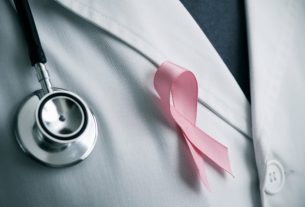Rectal cancer is a type of cancer that affects the final part of the large intestine, known as the rectum, and can cause symptoms such as blood in the stool, abdominal pain, diarrhea, constipation, frequent urge to have bowel movements and weight loss.
Cancer that develops in the large intestine can also be called colorectal cancer, which is more common in older people who smoke and consume a lot of red meat and in case of a family history of bowel cancer. Learn more about colorectal cancer.
If you suspect rectal cancer, it is important to consult a coloproctologist or general practitioner. Treatment may involve surgery to remove the tumor and chemotherapy and/or radiotherapy.

Main symptoms
The main symptoms of rectal cancer are:
- Bleeding from the rectum, which can sometimes be noticed in the stool;
- Abdominal pain;
- Thinner stools;
- Change in bowel movement frequency, which may cause constipation or diarrhea;
- Frequent urge to evacuate;
- Weight loss.
It is common for people with rectal cancer to develop anemia due to blood loss and, in more serious cases, intestinal obstruction may also occur, resulting in symptoms such as stopping bowel movements and abdominal swelling. See the symptoms of intestinal obstruction.
Symptom Test
Rectal cancer is a type of colorectal cancer. To find out the chances of having colorectal cancer, select the symptoms you present below:
This test is only a guidance tool and is not intended to provide a diagnosis or replace consultation with a coloproctologist or general practitioner.
How to confirm the diagnosis
The diagnosis of rectal cancer is made by a coloproctologist or general practitioner based on symptoms and the results of tests such as colonoscopy and biopsy, which can show the presence of cancer cells. Find out more tests to detect rectal cancer.
If you want to make an appointment, you can find the coloproctologist closest to you using the tool below:
Taking care of your health has never been easier!
When the diagnosis is confirmed, it is common to recommend other tests, such as MRI of the pelvis and CT scan of the chest and abdomen, to check the stage of the cancer and indicate the most appropriate treatment.
Possible causes
Rectal cancer is caused by genetic changes that appear randomly in cells and cause them to multiply abnormally. However, there are genetic diseases, such as Lynch syndrome and familial adenomatous polyposis, which greatly increase the chance of these changes occurring.
In addition, the risk of rectal cancer is higher in people over 50 years of age, who smoke, consume a lot of red meat or alcohol, are obese and have a family history of rectal cancer or inflammatory bowel disease, such as ulcerative colitis.
How the treatment is carried out
Rectal cancer is treated through surgery, especially in the early stages. However, the doctor may recommend chemotherapy and/or radiotherapy before surgery to reduce the size of the tumor and facilitate its removal, in some cases.
Sometimes, the doctor may also recommend chemotherapy and/or radiotherapy after surgery to complement the removal of the tumor by eliminating possible cancer cells that remain in the body.
Currently, a drug known as dostarlimab has been studied to treat rectal cancer in people with a specific genetic change. However, although the results are promising, more studies are needed before this medication is approved for this purpose.
Is rectal cancer curable?
Rectal cancer can be cured in some cases, especially when the diagnosis is made when the tumor is still in its early stages and treatment is carried out according to the doctor’s instructions.
Bibliography
- CDC. Colorectal (Colon) Cancer. Available at: <https://www.cdc.gov/cancer/colorectal/index.htm>. Accessed on 20 Jul 2023
- STATPEARLS. A Review of Hereditary Colorectal Cancers. 2022. Available at: <https://www.ncbi.nlm.nih.gov/books/NBK538195/>. Accessed on 20 Jul 2023
- CLEVELAND CLINIC. Rectal Cancer. Disponível em: <https://my.clevelandclinic.org/health/diseases/21733-rectal-cancer#symptoms-and-causes>. Acesso em 20 jul 2023
- BABAR, Quratulain et al. Promise of dostarlimab in cancer therapy: Advancements and cross-talk considerations. Drug Discov Today. Vol.28, n.6. 103577, 2023
- CURVO-SEMEDO, Luís. Rectal Cancer: Staging. . . . Magn Reson Imaging Clin N Am. Vol.28, n. 105–115,
- HOLTEDAHL, Knut et al. Symptoms and signs of colorectal cancer, with differences between proximal and distal colon cancer: a prospective cohort study of diagnostic accuracy in primary care. BMC Family Practice. Vol.22, n.148. 2021
- STATPEARLS. Rectal Cancer. 2022. Available at: <https://www.ncbi.nlm.nih.gov/books/NBK493202/>. Accessed on 06 Dec 2022
- GAERTNER, Wolfgang B. et al. Rectal cancer: An evidence-based update for primary care providers. World J Gastroenterol. Vol.21, n.25. 7659–7671, 2015

Sign up for our newsletter and stay up to date with exclusive news
that can transform your routine!
Warning: Undefined array key "title" in /home/storelat/public_html/wp-content/plugins/link-whisper-premium/templates/frontend/related-posts.php on line 12
Warning: Undefined array key "title_tag" in /home/storelat/public_html/wp-content/plugins/link-whisper-premium/templates/frontend/related-posts.php on line 13



